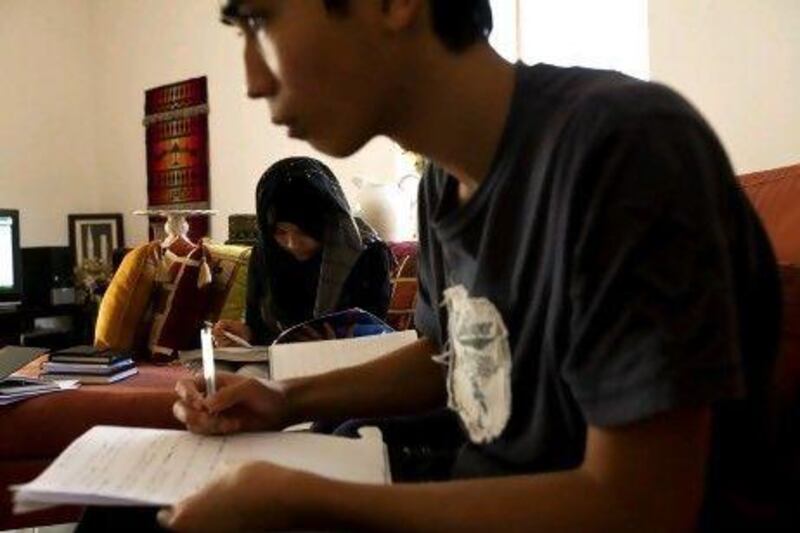DUBAI // Two years before most students take the IGCSE college entrance test, 14-year-old Syazwina Hamdan is getting ready for the examination this year.
She says she owes her preparation to a teacher who knows her best - her mum.
"My mother knows my weaknesses, so she teaches my weakness and challenges my strengths," said Syazwina, an expressive teenager who hopes to be a writer.
"I like home schooling because it's flexible. My mother is strict but I can always ask her for help."
Syazwina's brother, Hazwan, 16, will also take the IGCSE test in November.
Both Malaysian teenagers have been home schooled for the past two years after their parents pulled them from Dubai schools, disappointed with the teaching.
A shade quieter than his sister, Hazwan also prefers studying in the living room of their Mirdif home instead of a noisy classroom.
"It's much easier because I don't have any distractions," said Hazwan, who plans to study aviation engineering back in Malaysia. "It's just me, my books and the computer."
The only downside is taking the exams with his younger sister.
"It's a bit awkward that I'm taking it with her," he laughed. "But it will be fine."
Syazwina has no such inhibitions. Even while they tease each other, the affectionate bond between the siblings is clear.
"It's fun for me because sometimes when we compete, he feels the pressure," grinned Syazwina. "I don't, because I'm younger."
She hopes to have time off next year to learn a language until she figures out what is next on her agenda.
Both teenagers have been taught subjects including science, advanced maths and English by their mother, Salina.
The former chemistry teacher and her architect husband were not always confident about home schooling.
"We had doubts and thought, 'Can we make a commitment?'," she said."In our culture, parents are too scared. People ask me, 'How will the children go to university?'"
Aware of the entry requirements, Mrs Hamdan is certain that her children's strong grades and strong volunteer ethos give them an edge.
Her youngest, Nurdiyana, 9, is also home schooled, but will rejoin a school for a while so her mother can focus on the elder children.
The children wake up early, help with housework, begin studying at 9am in 45-minute or hour-long slots, and end work at 3-4pm.
They meet friends from their old school or other home schooled children every Thursday.
Meeting other home school families is comforting because they do not need to defend their beliefs.
The meetings also help parents pool their experiences and knowledge.
Mrs Hamdan plans to team up with other mothers so she can help with maths or science, and her children can learn from parents who have studied literature.
The teenagers, meanwhile, make sure that parents are kept out of some home school meetings, such as their book club.
"Parents sometimes tell us to discuss some books," Syazwina said. "But we don't really listen. Sometimes we do, but mostly we like to decide on our own."







